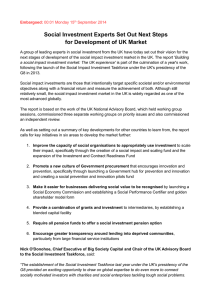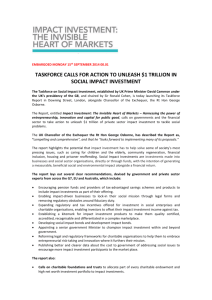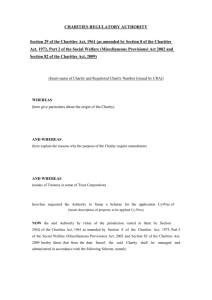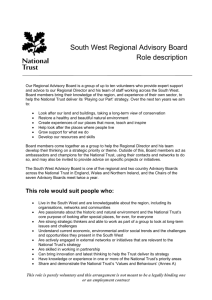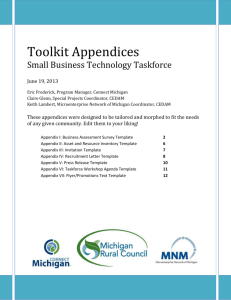Social Investment Experts Set Out Next Steps for Development of UK
advertisement
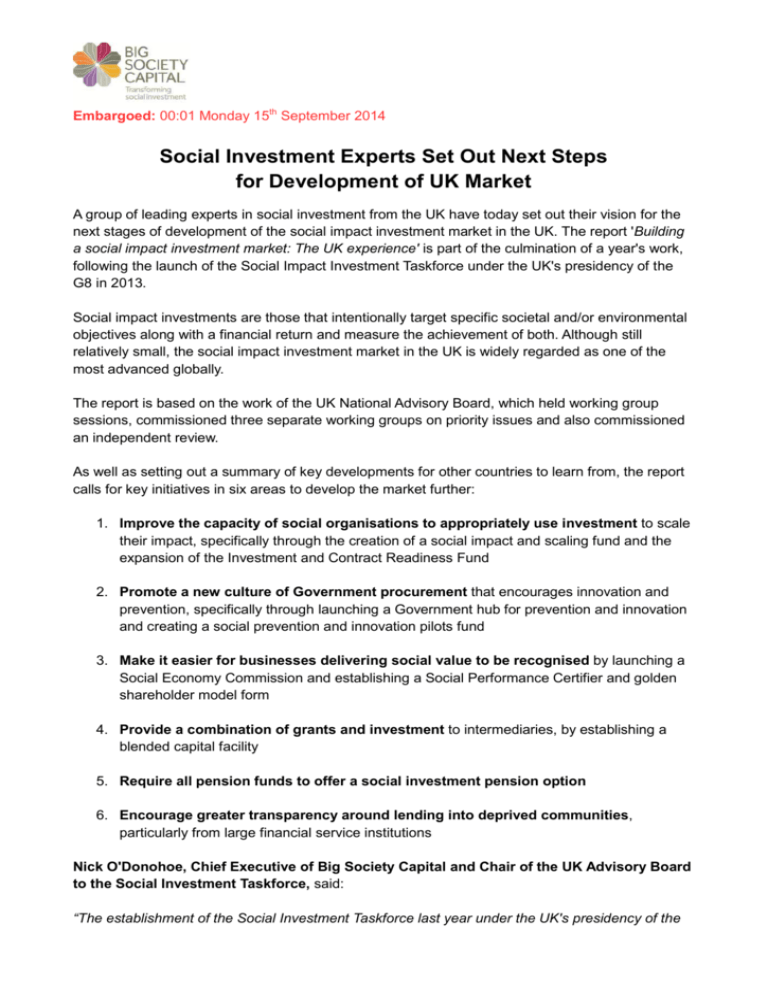
Embargoed: 00:01 Monday 15th September 2014 Social Investment Experts Set Out Next Steps for Development of UK Market A group of leading experts in social investment from the UK have today set out their vision for the next stages of development of the social impact investment market in the UK. The report 'Building a social impact investment market: The UK experience' is part of the culmination of a year's work, following the launch of the Social Impact Investment Taskforce under the UK's presidency of the G8 in 2013. Social impact investments are those that intentionally target specific societal and/or environmental objectives along with a financial return and measure the achievement of both. Although still relatively small, the social impact investment market in the UK is widely regarded as one of the most advanced globally. The report is based on the work of the UK National Advisory Board, which held working group sessions, commissioned three separate working groups on priority issues and also commissioned an independent review. As well as setting out a summary of key developments for other countries to learn from, the report calls for key initiatives in six areas to develop the market further: 1. Improve the capacity of social organisations to appropriately use investment to scale their impact, specifically through the creation of a social impact and scaling fund and the expansion of the Investment and Contract Readiness Fund 2. Promote a new culture of Government procurement that encourages innovation and prevention, specifically through launching a Government hub for prevention and innovation and creating a social prevention and innovation pilots fund 3. Make it easier for businesses delivering social value to be recognised by launching a Social Economy Commission and establishing a Social Performance Certifier and golden shareholder model form 4. Provide a combination of grants and investment to intermediaries, by establishing a blended capital facility 5. Require all pension funds to offer a social investment pension option 6. Encourage greater transparency around lending into deprived communities, particularly from large financial service institutions Nick O'Donohoe, Chief Executive of Big Society Capital and Chair of the UK Advisory Board to the Social Investment Taskforce, said: “The establishment of the Social Investment Taskforce last year under the UK's presidency of the G8 provided an exciting opportunity to draw on global expertise to do even more to connect socially motivated investors with charities and social enterprises tackling tough social problems. The recommendations published today set out a compelling vision to take this forward, and we hope that other countries will be able to learn from the UK's experience to-date. However, in the UK there is much more that needs to be done to ensure that charities and social enterprises can access appropriate investment, and to enable more socially-minded investors to enter the market. We are committed to working with partners from across the social and finance sectors, as well as government, to help make a thriving and sustainable social investment market in the UK a reality.” Daniela Barone Soares, Chief Executive of Impetus-PEF and Chair of the working group on Building the Capacity for Impact, said: "Our paper highlights that there are two types of capacity-building required by the social sector – one is around building strong resilient organisations, with good governance, systems, controls and management. The other is around building organisations which can reliably and predictably produce meaningful social outcomes, eventually for large numbers of people. Both are crucial for the social investment market to flourish, but the latter has been largely neglected in attempts to develop the market. We recommend much more investment in, and support for, organisations to build these 'outcome-producing' capabilities - for the good of investors, investees, and for those who need 'outcomes' most of all, those in our most deprived communities." Toby Eccles, Development Director of Social Finance and Chair of the working group on Recommendations on Procurement, said: “If you were to design a model to keep innovation out of government, present procurement practices would be hard to beat. Major change is required if we are to move away from a one size fits all approach to services that fit the needs of the people using them rather than the needs of the system. Drawing on lessons learnt by the IT industry and elsewhere, we recommend a completely different approach to government procurement which would have a profound impact and enable more prevention and more innovation in social services.” James Perry, Chief Executive of Panaphur and Chair of the working group on The Social Business Frontier, said: “The legal and regulatory environment for business and charity in the UK was established in an analogue age where profit and social good were conceived as separate. Certain sectors of business and charity have now moved into the digital age. Entrepreneurs, investors, charities and governments are collaborating and aligning to create profits with purpose – delivering measurable social value alongside financial value. New structures, such as Benefit Corporations, Social Impact Bonds and Community Interest Companies, are being conceived and adopted around the world, and offering the promise of a step-change in the ability of charities and businesses to create social value . The time has come for a strategic response in the legal and regulatory environment so as to support, rather than inhibit, these developments”. Notes to editors For further details and interview enquiries please contact: David Dinnage, Big Society Capital ddinnage@bigsocietycapital.com / 020 7186 2510 / 0788 587 9500 Members of the UK Advisory Board are available for interview. In addition, case studies of charities and social enterprises using social investment are available (some examples are listed below). Early copies of Building a social impact investment market: The UK experience are available on request. About the UK Advisory Board to the Social Investment Taskforce established under the UK's presidency of the G8 The UK Advisory Board was established in June 2013, as part of the Social Investment Taskforce, led by Sir Ronald Cohen, and established under the UK's presidency of the G8. Alongside the publication of the Social Investment Taskforce report, the UK Advisory Board today publishes its final report and three working group papers. The following reports are published today: • Building a social impact investment market: The UK experience • Building the Capacity for Impact • Recommendations on Procurement • The Social Business Frontier All reports will be available from 10am on Monday 15th September 2014 at: http://www.bigsocietycapital.com/social-investment-research-library Members of the UK Advisory Board Nick O'Donohoe, Big Society Capital (Chair) Bernard Horn, Social Finance Cliff Prior, UnLtd Daniela Barone Soares, Impetus-PEF David Gregson, CRI David Hutchison, Social Finance David Royce, CRI Dawn Austwick, Big Lottery Fund Deidre Davies, Deutsche Bank Geoff Mulgan, Nesta Harvey McGrath, Big Society Capital James Perry, Panahpur James Vaccaro, Triodos Jim Clifford, Bates, Wells, Braithwaite Johannes Huth, Impetus-PEF John Kingston, Association of Charitable Foundations Jonathan Jenkins, Social Investment Business Mark Boleat, City of London Corporation Michele Giddens, Bridges Ventures Nat Sloane, Big Lottery Fund Peter Holbrook, SEUK Peter Wanless, NSPCC Philip Colligan, Nesta Philip Newborough, Bridges Ventures Rob Owen, St. Giles Trust Sir Anthony Greener, St. Giles Trust Toby Eccles, Social Finance William Shawcross, Charity Commission Examples of social investment Providing sustainability to a community centre Greenway Centre, Bristol The Greenway Centre is in one of the most deprived area of Bristol. It provides training courses for job seekers, fitness classes which help referrals from local GPs and Hornfield prison, facilities for local groups and a business centre for local start-ups. The Centre took a loan for £55k from Pure Leapfrog Community Energy Fund (which received a £1m investment from Big Society Capital) which enabled the centre to install 207 solar panels. The panels generate income for the Centre from the national feed-in tariff, and reduce their overheads. Reducing youth unemployment Energise Social Impact Bond, Thames Valley Adviza is a charity that runs the Energise project. It works with 14 and 15 year olds who have been identified as being at high risk of dropping out of school and becoming unemployed. The project is financed through a Social Impact Bond, a partnership between Adviza, Social Finance, Big Society Capital and the Department of Work and Pensions. If the project is successful in meeting its targets, the Department of Works and Pensions repays investors through savings to the public purse. Supporting vulnerable older people Developing Empowering Resources in Communities (DERiC), Leeds The Garforth Neighbourhood Elders is a community organisation in Leeds. DERiC has invested £150,000 in the Garforth thanks to a £1 million loan from Big Society Capital. The money will be used to develop a scheme that will support isolated and vulnerable older people through community volunteering and better use of care budgets. The project reduces reliance on statutory services so that money can be reinvested by communities, and used to repay the loan.
